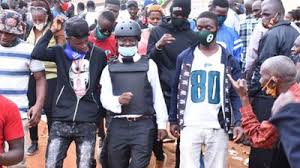The John Paul II Justice and Peace Centre, a Catholic Church institution comprising seven missionary congregations, and the United Nations Office on Drugs and Crime have warned of a new wave of crime that involves trafficking in persons for body organs and slavery.
Msgr John Baptist Kauta, the secretary general of the Uganda Episcopal Conference, said many Ugandans are being trafficked, especially to the Middle East, where they are subjected to slavery, cheap labour and their internal body organs harvested for ritual sacrifice.
“The majority of the victims are women aged between 20 and 30, and are being trafficked by fraud, deception, debt bondage, abduction and abuse of positions of vulnerability,” Msgr Kauta told journalists in Kampala yesterday.
He was representing Gulu Archbishop John Baptist Odama, who is the chairperson of the Justice Commission under the Uganda Episcopal Conference.
He made the remarks as the Catholic Church observed the international day of prayer and awareness against human trafficking yesterday.
Msgr Kauta cited, among others, rampant unemployment, poverty, high population growth and poor education system as the causes of human trafficking. He said last year, they rescued 17 Ugandans girls who were trafficked to Oman and Saudi Arabia, and forced into marriage, illicit organ trade, sexual exploitation and cheap labour.
The United Nations Office on Drugs and Crime also warned the public against foreign agencies promising jobs abroad, saying some of them are involved in the human body parts trade.
According to the notice, the foreign companies process the paper work, buy the air tickets pretending to find people jobs but they kill the victims and remove precious body parts such as the kidneys, which cost $262,000 (about Shs962m), the heart $119,000 (Shs437m) and the liver $157,000 (Shs576m).
Asked what they are doing to safeguard Ugandans against such vices, Mr Frank Mugabi, the spokesperson of the Ministry of Gender, Labour and Social Development, said government passed a law regulating all external labour recruitment agencies. Mr Mugabi said the law requires the companies to account for all the persons they take abroad and also ensure that they have phones to keep in constant contact.
In addition, the companies are required to deposit Shs50m to cater for repatriation of the person they take in case they die or they want to return home.
Mr Charles Twiine, the spokesperson of Police’s Criminal Investigations Directorate, said last year they registered nine cases of human trafficking and 15 suspects were prosecuted and convicted.
Mr Twiine said the vice was rampant between 2017 and 2010 when police had not developed capacity to investigate and prosecute such cases. He revealed that the most affected are children aged 17 or below who are often destined for Oman, Quatar, Dubai and Jordan.
He warned that save for Dubai, where government has secured bilateral agreements to export labour, nobody should be duped that there are jobs in Jordan and Oman, because government does not have bilateral agreements with those countries.
Background
According to the Annual Crime Report of 2018, at least 286 incidents related to trafficking in persons were registered by the police compared to 177 cases recorded in 2017. The report indicated that majority of the registered incidents were of transnational nature and most of these involved adults.


